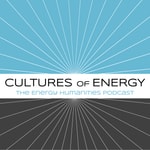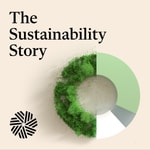Cultures of Energy – Details, episodes & analysis
Podcast details
Technical and general information from the podcast's RSS feed.

Cultures of Energy
Dominic Boyer
Frequency: 1 episode/15d. Total Eps: 234

Recent rankings
Latest chart positions across Apple Podcasts and Spotify rankings.
Apple Podcasts
🇬🇧 Great Britain - socialSciences
26/07/2025#95🇬🇧 Great Britain - socialSciences
25/07/2025#77🇬🇧 Great Britain - socialSciences
24/07/2025#57🇨🇦 Canada - socialSciences
17/07/2025#91🇨🇦 Canada - socialSciences
16/07/2025#78🇺🇸 USA - socialSciences
16/07/2025#87🇨🇦 Canada - socialSciences
15/07/2025#57🇺🇸 USA - socialSciences
14/07/2025#68🇺🇸 USA - socialSciences
03/07/2025#74🇬🇧 Great Britain - socialSciences
02/07/2025#81
Spotify
No recent rankings available
Shared links between episodes and podcasts
Links found in episode descriptions and other podcasts that share them.
See all- https://www.bravotv.com/top-chef
41 shares
- https://www.raicestexas.org/
24 shares
- https://timotheeparrique.com/
18 shares
RSS feed quality and score
Technical evaluation of the podcast's RSS feed quality and structure.
See allScore global : 53%
Publication history
Monthly episode publishing history over the past years.
221 - Planetarity Now! (with Jonathan Blake and Nils Gilman)
mardi 9 juillet 2024 • Duration 01:22:35
Dominic and Cymene are beaming to you this week from a European Cup-addled Berlin. They share a few reflections on their time in Cape Town and then ruminate on why it is it doesn’t seem possible to hate anyone from California. Is it the sunshine? As if to underscore this point about the essential good of Californians, we welcome to the podcast (15:55) two brilliant residents of the Golden State, Berggruen Institute based political philosophers Jonathan Blake and Nils Gilman to talk about their new book, Children of a Modest Star: Planetary Thinking for an Age of Crises (Stanford UP, 2024). We start with the concept of subsidiarity and why they view it as crucial to creating new kinds of political institutions capable of managing planetary challenges like climate change and health crises. They explain why it’s problematic that so much sovereignty is bound to the nation-state when the scale of planetary challenges exceeds nation-states. Similarly, we talk about how that disables multilateral institutions like the United Nations from engaging planetary challenges effectively too. From there we turn to the need for new supranational institutions to reign in corporate power, why they are not calling for a world government, the importance of planetary sapience and remote sensing and close with a discussion of why they emphasize the importance of multispecies flourishing in the project. Please listen, read and share!! ps Special shout out to Alex Gardels from Berggruen for engineering the recording of this week’s interview.
220 - Design Earth (with Rania Ghosn)
vendredi 24 mai 2024 • Duration 01:07:35
Cymene and Dominic recap last week’s Petrocultures Los Angeles conference and discuss the new climate lawsuit filed in France seeking to press criminal charges against the CEO and directors of the French oil major TotalEnergies. Then (15:27) we welcome the brilliant and megatalented Rania Ghosn to the podcast. We start with the work of Design Earth, Rania’s practice together with El Hadi Jazairy and how the collaboration began. Rania explains how Design Earth seeks to explore how design can help respond to the climate crisis and why they tend to work in a narrative or speculative mode. We discuss their strategies for cultivating what she calls “geostories” at the intersection of art, science and design. From there we move to talking about what energy means in the context of design, how the ruins of carbon modernity will haunt urbanism and landscapes for many years to come, speculative ecofeminist storytelling, and the art of making exquisite corpses. We close talking about what it means to inherit the world in all its crisis and how to learn to live in a time of collapse.
211 - Half Earth Socialism (feat. Drew Pendergrass and Troy Vettese)
mardi 13 septembre 2022 • Duration 01:12:04
Cymene and Dominic talk about hauling ice, champagne socialism and the mystery of Viennetta cakes on this week’s intro. Then (16:07) we are joined by Troy Vettese, an environmental historian, and Drew Pendergrass, an environmental engineer, to talk about their bold and imaginative new book, Half-Earth Socialism: A Plan to Save the Future from Extinction, Climate Change and Pandemics (Verso 2022, https://www.versobooks.com/books/3818-hal). We begin with the value of thinking in impractical ways and how utopian socialists past like Edward Bellamy, William Morris and Otto Neurath inspired this project. We discuss how high growth expectations have bedeviled planning in the past and talk about the flaws in the utopia of automated luxury socialism. Is capitalism an inherently irrational system? Does planning have irrational tendencies too? We cover where the idea to make a game version of the book came from (https://play.half.earth). We move from there to what the Left could stand to learn from the tactics of the neoliberal revolution, the necessity of utopian imagination for mass organizing, how intellectuals underestimate the readiness of the working class for change and much, much, more. Also please check out Drew and Troy’s Noema essay based on the book at: https://www.noemamag.com/planning-an-eco-socialist-utopia/
121- Heather Paxson
jeudi 12 avril 2018 • Duration 01:09:07
Dominic and Cymene plug Cultures of Energy 7—this year’s energy humanities symposium at Rice which begins today, details at culturesofenergy.org—and then they turn to cheese, why it’s funny, how it can be applied to cats, “cheddaring,” and much more. Is there an anthropologist who knows more about cheese than anyone? Yes of course there is, it’s MIT’s Heather Paxson, author of the award-winning The Life of Cheese: Crafting Food and Value in America (U California Press, 2012). She joins us (14:59) to talk about her research on the microbiopolitics of food and naturally we begin with what’s in her fridge. Heather tells us about her investigation of artisanal cheesemaking and what it tells us about the shift from Pasteurian to Post-Pasteurian regimes of microbiopower. We hear about goat ladies as revolutionaries, the truth about vegan cheese, and debate whether artisanal foodmaking is an elite project. Heather discusses the search for moral meaning in everyday life as a throughline in her work and we turn to her latest research on food safety inspections, the porosity of food borders and the synecdochic reasoning of the state when it comes to managing food flows. We close by discussing the impact of feminist analytics of labor in her research. What is “beef candy China”? Listen on and you might just find out!
120 - Brian Larkin
jeudi 5 avril 2018 • Duration 01:16:50
Dominic and Cymene discuss the Houston city government’s recent decision to elevate new homes in the floodplains and they take a few moments to plan their dream dinner parties. We then (18:12) teleport you to the office of amazing Columbia anthropologist and infrastructure guru, Brian Larkin. Brian explains to us how his interest in practices of media circulation led him to research infrastructures of communication and mediation. That leads us to his recent work on electricity in Nigeria, the productivity of the grid’s failure and the ontogenesis of new electric systems like generators. We talk about how the state and modernity figure into electrical discourse, ambient infrastructures, the in/visibilization of infrastructure, and how technology overcodes space in order to create its conditions of existence. We then turn to China’s becoming a global infrastructural powerhouse and how the digital infrastructures of everyday life differ across the world. We stump Brian momentarily as to his own ideal dinner party companions but he reciprocally blindsides us with the information that his masters thesis was on … wait for it … Donald Trump and then shares what he learned about Trump’s appeal. We talk about the explosion of both the conception and reality of mediation in the Internet era and whether a Media Worlds vol 2 might be coming. We close on questionsof infrastructural repair and being perpetually in beta. Hey, who’s on your dinner party wish list?
119 - Petroculture Doubleheader (feat. Carola Hein, Rebecca Babcock & Jason Lagapa)
jeudi 29 mars 2018 • Duration 01:35:23
This week on the Cultures of Energy podcast we offer up a special double episode of petrocultural analysis. Cymene and Dominic set the stage with a new offshore pub concept, The Oily Hound, and then in the first segment (9:26) Dominic chats with Carola Hein from TU-Delft about her work at the intersection of oil, architecture and cities. They talk about her current research on the “global petroleumscape,” how the constant reinvention of oil has transformed urban environments over time, her design studios on imagining post-oil cityscapes in places like Rotterdam and Dunkirk and the uneven and somewhat paradoxical greening of petroscapes in the 21st century. They close by ruminating on whether the world is really done with oil and what sea level rise will mean for the Netherlands. In our second segment (59:00) Cymene and Dominic speak with Rebecca Babcock and Jason Lagapa from the University of Texas of the Permian Basin about their NEH-funded “Boom or Bust” project (https://www.utpb.edu/cas/academic-departments/literature-and-languages-department/boomorbust/) that collects the energy stories of West Texas and sponsors public conversations around energy’s economic and social impacts in the region. We talk about their experiences organizing book clubs and writing workshops and what they’ve learned—about the precarity of energy jobs, economic justice, the relations between landowning and working families, and local perceptions of climate change—along the way. We close with what people are making of wind power in West Texas.
118 - Candis Callison
jeudi 22 mars 2018 • Duration 01:07:08
Dominic and Cymene talk Tom Waits, velour jumpsuits and the long afterlife of Hurricane Harvey. And then (13:33) we are most fortunate to welcome to the podcast Candis Callison (U British Columbia) a scholar doing amazing work on indigeneity, climate change and journalism. We start by discussing the wonderful podcast, Media Indigena, which Candis co-hosts with Kim TallBear and Rick Harp, which tackles indigenous issues across North America, including most recently the politics of pipeline expansion in Canada. We move from there to Candis’s recent book, How Climate Change Comes to Matter: The Communal Life of Facts (Duke U Press 2014), which explores the multiplicity of meanings of “climate” and “climate change” in different discourse communities ranging from the Inuit to journalists to evangelical Christians in the United States. We talk about the paradoxes journalists face in trying to provide objective and yet affective reporting on climate issues and whether indigenous media projects have different stories to tell than mainstream climate journalism. We turn from there to how we can collaborate on climate issues despite different cultures and meanings, the ethics of care, the layering of climate change upon colonialism in the Arctic and why “collective continuance” is a better way of thinking about the climate struggle than individualist environmentalism. Check out Candis’s recent podcasts at (https://www.mediaindigena.com/podcast/) and take frequent breaks from the news this week to think about warm puppies!
117 - Orit Halpern
vendredi 16 mars 2018 • Duration 01:01:25
Cymene and Dominic share wild tales on this week’s Spring Break edition of the Cultures of Energy podcast and make the case for #feralgarden4thward as the weedy edge of Houston urbanism. Then (11:30) we welcome the fantastic Orit Halpern to the podcast to discuss her research at the intersection of data, smartness, resilience and cities. We start off with her recent book, Beautiful Data: A History of Vision and Reason since 1945 (Duke U Press, 2015) and what it teaches us about how ubiquitous computing became positioned as the solution to all our ills. We talk about the importance of cybernetics to this story and Orit gives us her take on its origins, rise to prominence, and impact on how we understand rationality before we turn to the aesthetics and affects of data and how cybernetics has informed contemporary obsessions with “smartness” and “resilience.” That brings us to Orit’s new book project, The Smartness Mandate, and she tells us about the paradigm shift from environment to ecology in the 1970s, how cybernetic thought machines came to inform governmentality, and how financial instruments have come to be fused into projects of ecology. Finally we do a deep dive into the surveillance apparatuses and infrastructural sublime of smart cities, exploring how one can grapple analytically with these ideas without becoming submerged in smartness’s own logic of versioning and iterability. Why join the Borg? They might be better than your bad boyfriend. For that to make sense, listen on!
116 - Dana Powell
jeudi 8 mars 2018 • Duration 57:40
Happy International Women’s Day from the Cultures of Energy podcast! Cymene and Dominic struggle to remember an Indigo Girls song and reminisce about desert Stonehenge and vegan punk. Then (12:18) we welcome to the podcast anthropologist Dana Powell who has just published a remarkable new book, Landscapes of Power (Duke U Press, 2018), on the long and complicated history of Diné (Navajo) engagements of energy from oil and uranium to coal and sheep. We begin with the story of what brought her to the study of Diné energy and environmental concerns and how and why the energopolitics of coal and indigenous sovereignty came to dominate her fieldwork. We talk about the resonance of OPEC for Navajo nationalism, the significance of Diné mineral rights, the need to complicate our understanding of what indigenous resistance looks like in terms of energy, the importance of Standing Rock, and the importance of extraction for the Navajo national economy. We turn from there to the growing awareness of climate change impacts on the Colorado plateau, the rising interest in renewable energy in Navajo nation and Diné metaphysics of landscape. Dana shares her reflections on the ethics of ally work and her advice on doing it well. We close with a discussion of indigenous futurist art and how it has inspired her work.
115 - Joshua Reno
vendredi 2 mars 2018 • Duration 01:03:52
Dominic and Cymene make a cinematic announcement and offer dubious pronunciations. Then (13:05) we welcome to the podcast legendary anthropologist of waste, Joshua Reno from Binghamton University, author of Waste Away: Working and Living with a North American Landfill (U California Press, 2015). We remind Josh first of all about his undergraduate thesis on the “Columbine effect” in American society and talk through school shootings as a media, racial and political phenomenon ever since. Josh explains how he got interested in studying the United States as a “nation of landfills” and we talk about landfills’ logic of material repression and how they enable fantasies of limitless growth. We discuss the need to rescale waste and make visible its social, material and multispecies dimensions and Josh describes the advantages of his biosemiotic approach to theorizing waste. We turn from there to wastework as a form of labor, metabolism as a conversation in the human sciences, and the energy/waste nexus. Josh explains how many waste-to-energy projects don’t actually trouble the logic of landfill as much as one might expect and the connection he sees between denying waste and denying death in our culture. We discuss the dark horizon of spectacular disaster waste that will accompany climate change and close with a discussion of Josh’s current book project about what happened to all that Cold War American military hardware that wasn’t used in battle. Interested in hearing about landfill ghosts? Then listen on!









